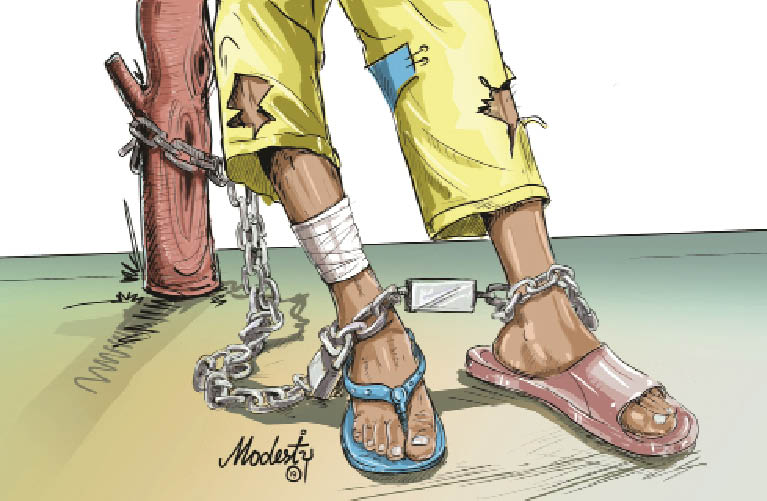Mental health disorders and behavioural problems affect both adults and children. Studies have shown that its burden in Nigeria is increasing, especially with increasing cases of substance abuse.
According to Dr. Shehu Sale, the Medical Director and Chief Executive Officer of Federal Neuropsychiatric Hospital, Kware, Sokoto State, mental health involves the psychological, mental and physical well-being of the individual.
“Once you have problem with your mental faculty, it means other aspects of your life, social, occupation, family, education, are affected. In Nigeria, the life-time and 12-month rate of at least one mental health disorder is about 12.1 per cent and 5.8 per cent respectively, and an estimated 5,000 Nigerians commit suicide every year,” he said.
Dr. Sale, who is also a Master Trainer with the United Nations Office on Drug and Crime (UNODC), said mental health cut across all life cycles but that it was most common during adolescence.
“This is because of the prevailing social circumstances, educational stress, substance abuse and economic situation in the country, so they are more likely to come down with mental illness at that stage than any other within the life circle of individuals from birth to death,” he said.
Asked if there is any difference in how mental illness affects males and females, he said it depended on the type of mental illness.
He said depression which was the most common mental illness was more common among females for many reasons such as hormonal differences, women being more expected to confine to family norms, living circumstances in the family, managing children and because they were more likely to be abused sexually or physically. Others include the fact that females are usually more prone than males to keep things to themselves and keep on thinking about them; and eventually lack of ventilation will make them come down with those kinds of cases, he added.
He said Attention Deficit/Hyperactivity Disorder (AD/HD) that was supposed to be more common in males for many reasons was also common in females and that identification by the attending physicians was poorer for females than for males because of symptoms.
“In females, it is difficult to detect and refer to tertiary institutions; we see more of boys. Because of the way they present with symptoms, they are more likely to be identified with the problem than females. The males are very hyperactive, fidget, they can’t stand still, so these kinds of things are more commonly identified compared to the inactivity type; so they suffer in silence,” he said.
The associate professor who is leading notable initiatives at the hospital, said stigma and discrimination against people living with mental disorders affected their education, employment, and that access to care hampers their capacity to contribute to society.
He added that the majority of developmental and poverty alleviation programmes did not reach persons with mental or psychosocial disabilities and that despite the huge burden of diseases accruing from mental health, very little resources, if any, were devoted to it, he said.
He said about a third to nearly half of those with severe mental health conditions did not receive care in developed countries based on WHO’s World Mental Health Survey.
Dr. Sale further said the picture was even bleaker for developing countries, including Nigeria, where about two-thirds to nearly nine in every 10 persons with severe mental conditions did not receive care.
He added that the disparity might likely be because of the grossly insufficient number of mental health professionals, especially in developing countries like Nigeria, where the ratio was about one psychiatrist to a million people.
He lamented that some people resorted to traditional remedies rather than the hospital and that because of the stigma associated with mental illness, people hid under spiritual and other issues.
“But I will like to tell you that mental illness is like other physical illnesses, it has signs and symptoms like any other disease, it is the disease of the mind, just like you have liver problems, it also affects mind and brain, so it has signs like any other physical illness and you get better provided you comply with your drugs and clinic attendance,” Dr. Sale clarified.
He said there were two Federal Neuropsychiatric Hospitals in the North West; one in Barnawa, Kaduna State and the other in Kware, Sokoto State, and added that “because they are at the extremes, they cover many states: Kebbi, Zamfara Sokoto and even neighbouring countries, Benin Republic, and particularly Niger, and to some extent, Togo.
“Most of the patients have no money, they have no support, their relations have abandoned them, by the time they make deposit, they go, and you don’t see them. The patients overstay at the hospital. This places additional burden on the hospital, we take the responsibility of taking them to their places. There is no Internally Generated Revenue (IGR) in a psychiatric hospital; we are operating from hand to mouth.
However, he said some patients were taken care of by the Zakat and Endowment commissions in Sokoto, and the Federal Government.
The mental health expert commended the Federal Government for the renovation works in the hospital and the Sokoto State Government for supporting the hospital with an ambulance and other materials.
He, therefore, appealed to wealthy individuals and organisations to support the hospital.
Dr. Sale said the Federal Government was working towards integrating mental health into the Primary Health Care (PHC).
“We have electricity problems here. We hardly have electricity for two hours in 24 hours. We operate on generator and there is no IGR. So most of the time, we are in darkness. We are in need of critical staff, to start a family clinic. We need like double of the existing present staff to be able to function effectively,” he lamented.

 Join Daily Trust WhatsApp Community For Quick Access To News and Happenings Around You.
Join Daily Trust WhatsApp Community For Quick Access To News and Happenings Around You.


